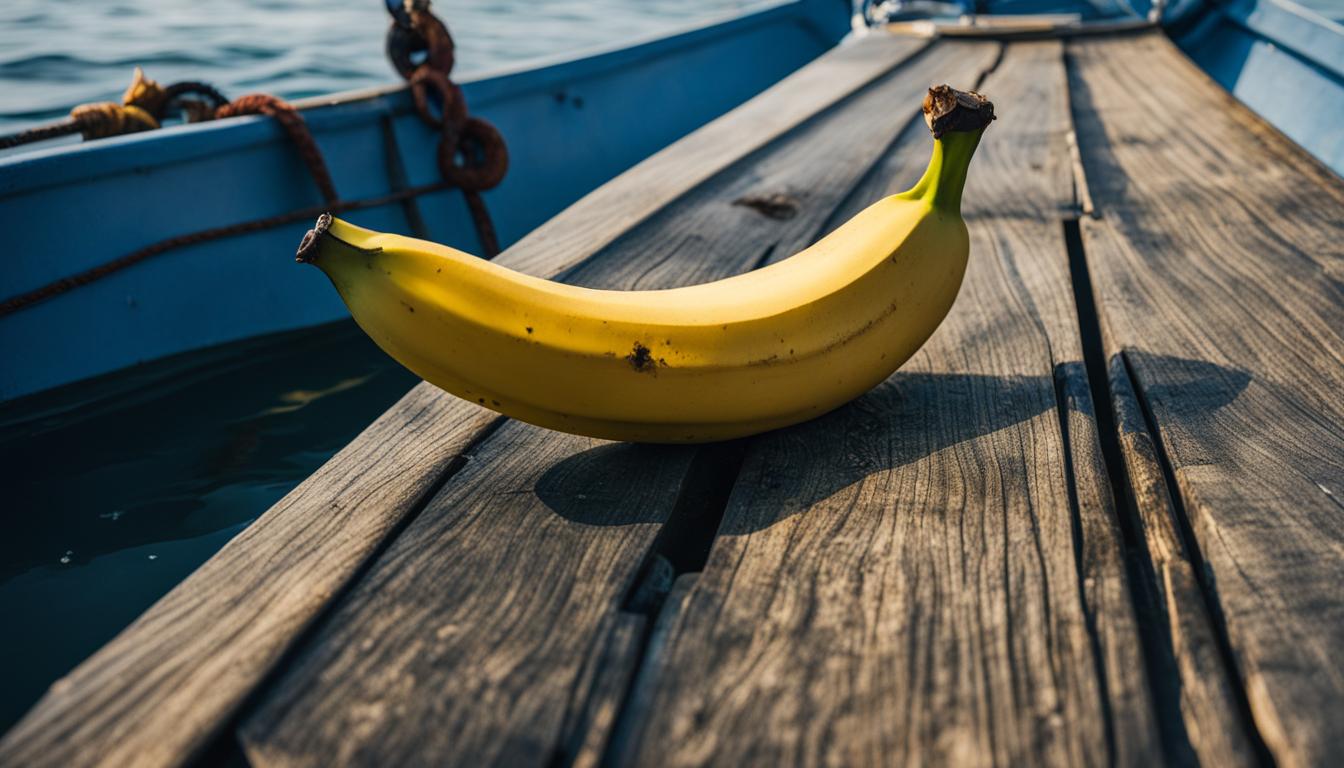Have you ever heard of the superstition that bananas are bad luck on a fishing boat? It’s one of those curious maritime traditions that has been passed down through generations of fishermen. Many believe that bringing bananas on board can lead to a lack of fish, engine trouble, or even dangerous weather conditions. But is there any truth to this fishing superstition?
Today, we’ll dive into the origins of the banana superstition, explore its impact on fishing practices, and debunk some common misconceptions. Whether you’re a seasoned fisherman or simply intrigued by maritime folklore, join us as we unravel the mystery surrounding bananas and fishing luck.
Contents
- 1 The Origins of the Banana Superstition
- 2 The Impact of the Banana Superstition on Fishing Practices
- 3 Debunking the Banana Superstition
- 4 Modern Perspectives on the Banana Superstition
- 5 Conclusion
- 6 FAQ
- 6.1 What is the origin of the banana superstition?
- 6.2 Why do fishermen believe that bananas bring bad luck?
- 6.3 Are there any other superstitions related to bananas and bad luck?
- 6.4 Do all fishermen adhere to the banana superstition?
- 6.5 What factors could explain accidents on ships carrying bananas?
- 6.6 Are there any other fishing superstitions?
- 7 Source Links
Key Takeaways:
- The belief that bananas are bad luck on a fishing boat has been passed down through generations of fishermen.
- The exact origins of this superstition are unknown, but it is believed to have originated among sailors in the 18th or 19th century.
- Many fishermen avoid bringing bananas on board and may have specific rituals or lucky charms to counteract the supposed bad luck.
- There is no scientific evidence to support the banana superstition, and many modern fishermen rely on technology and scientific knowledge for a successful fishing trip.
- While the belief in the banana superstition remains prevalent in some fishing communities, others dismiss it as mere folklore or tradition.
The Origins of the Banana Superstition
The belief that bananas are bad luck on a fishing boat has been passed down through generations of fishermen, but its exact origins remain a mystery. This superstition is believed to have originated in the 18th or 19th century among sailors, who noticed a higher occurrence of accidents or mishaps on ships carrying bananas. The correlation between bananas and bad luck led to the development of the superstition, which has since become deeply ingrained in fishing traditions and folklore.
While the specific catalyst for this belief is unknown, some theories suggest that it may have been influenced by other superstitions. For example, in Chinese culture, green hats are considered to bring bad luck. The association between bananas and bad luck may have been strengthened by similarities in color or other cultural beliefs that were prevalent among sailors at the time.
“Many modern fishermen dismiss the superstition as mere folklore or tradition.”
Despite its historical significance, the banana superstition lacks scientific evidence to support its validity. Many modern fishermen and boating enthusiasts view it as nothing more than folklore or tradition. They argue that accidents or mishaps on ships carrying bananas can be attributed to factors unrelated to the fruit itself, such as faster shipping practices due to the perishable nature of bananas. Other factors like improper storage or the presence of pests attracted to the fruit can also explain any negative effects mistakenly attributed to bananas.
The Role of Folklore in Fishing Traditions
It’s important to recognize the role that folklore plays in fishing traditions and maritime culture. Superstitions like the belief in the banana curse add a sense of mystery and tradition to an industry deeply rooted in history. While some fishermen may choose to follow these superstitions out of caution or respect for their ancestors, many others have started to rely more on scientific knowledge and technology to ensure a successful fishing trip.
In conclusion, the origins of the banana superstition are shrouded in folklore and remain unclear. While it lacks scientific evidence, this belief continues to be passed down through generations, adding to the rich tapestry of fishing traditions and maritime culture.
The Impact of the Banana Superstition on Fishing Practices
The banana superstition has had a significant impact on fishing practices, particularly among more traditional or superstitious fishermen. Many believe that having a banana on board can bring a streak of bad luck, leading them to avoid bringing bananas or anything banana-related onto their boats.
Some fishermen take their superstitions even further, implementing additional measures to counteract the supposed bad luck associated with bananas. For example, they may ban the color yellow or anything resembling a banana from their vessels. Others have specific rituals or lucky charms that they believe can ward off ill fortune.
While it may seem irrational to some, these practices highlight the deep-rooted beliefs and cultural traditions within the fishing community. Fishermen often rely on their luck and superstitions to bring them good fortune and a successful catch. The banana superstition serves as a reminder of the importance of faith and ritual in their daily lives at sea.
| Lucky Charms | Belief |
|---|---|
| Rabbit’s Foot | Brings good luck and protection |
| Horseshoe | Wards off evil spirits and brings good luck |
| Four-Leaf Clover | Symbolizes good luck and fortune |
Debunking the Banana Superstition
Despite the widespread belief in the banana superstition, there is no scientific evidence to support the idea that bananas bring bad luck on a fishing boat. Many modern fishermen and boating enthusiasts dismiss the superstition as mere folklore or tradition. Some argue that the correlation between accidents and ships carrying bananas can be attributed to other factors, such as the perishable nature of bananas leading to faster and riskier shipping practices. Additionally, the negative effects attributed to bananas can be explained by other factors, such as improper storage or the presence of pests attracted to the fruit.
While it is understandable that superstitions hold significant cultural value, it is important to approach them with a critical and rational mindset. The banana superstition is one that has been perpetuated through generations, but it lacks any concrete evidence to support its claims. As times change and advancements in technology and knowledge are made, many fishermen are embracing a more scientific approach to ensure a successful fishing trip. Relying on weather forecasts, navigational tools, and expertise in fishing techniques, these modern fishermen prioritize empirical data over superstitious beliefs.
“The correlation between accidents and ships carrying bananas can be attributed to other factors, such as the perishable nature of bananas leading to faster and riskier shipping practices.”
It is important to note that superstitions can still play a role in the fishing community, and many individuals continue to adhere to the banana superstition out of habit or cultural significance. However, by questioning and debunking these long-standing beliefs, we can encourage a more logical and rational approach to luck and success on the water. Embracing a scientific mindset and relying on knowledge and technology can lead to a more productive and enjoyable fishing experience, without the unnecessary burden of superstitions.

The Impact of the Banana Superstition:
- Many fishermen avoid bringing bananas or anything banana-related onto their boats.
- Some fishermen ban the color yellow or anything resembling a banana from their vessels.
- Others have specific rituals or lucky charms to counteract the supposed bad luck associated with bananas.
Modern Perspectives on the Banana Superstition
While the belief in the banana superstition remains prevalent in certain fishing communities, many modern fishermen and boating enthusiasts do not subscribe to this belief. With advancements in technology and a better understanding of weather patterns, many fishermen rely more on scientific knowledge and technology to ensure a successful fishing trip rather than relying on superstitious practices.
Despite the lack of evidence supporting the banana superstition, it is important to acknowledge that superstitions and traditions can still hold significant cultural value for many individuals in the fishing community. These beliefs and rituals are often deeply ingrained and contribute to a sense of camaraderie and shared experiences among fishermen.
It is worth noting that superstitions like the banana superstition have persisted throughout history, even in the face of scientific advancements. They add an element of mystery and tradition to the fishing industry, showcasing the rich folklore and beliefs that have been passed down through generations.
| Pros of Believing in Superstitions | Cons of Believing in Superstitions |
|---|---|
|
|
Conclusion
The belief in the banana superstition as bad luck on a fishing boat holds a significant place in maritime traditions and fishing folklore. Despite the lack of scientific evidence to support this superstition, it continues to be passed down through generations of fishermen. Whether you believe in the power of banana superstition or not, it remains an intriguing part of fishing culture that adds a sense of mystery and tradition to the industry.
The impact of fishing superstitions, such as the banana superstition, on fishing practices cannot be denied. Many traditional or superstitious fishermen adhere to the belief that having a banana on board can bring bad luck. This has led to the avoidance of bananas or anything banana-related on their boats, and even the banning of the color yellow or anything resembling a banana. Some fishermen may also have specific rituals or lucky charms to counteract the supposed bad luck associated with bananas.
However, it is important to note that many modern fishermen and boating enthusiasts do not subscribe to the banana superstition. With advancements in technology and a better understanding of weather patterns, these individuals rely more on scientific knowledge and technology to ensure a successful fishing trip. Nevertheless, superstitions and traditions still hold significant cultural value for many individuals in the fishing community, highlighting the rich diversity of beliefs and practices within the industry.
FAQ
What is the origin of the banana superstition?
The exact origins of the belief that bananas are bad luck on a fishing boat are unknown. It is believed to have originated in the 18th or 19th century among sailors who noticed a higher occurrence of accidents on ships carrying bananas.
Why do fishermen believe that bananas bring bad luck?
Many fishermen believe that having bananas on board can lead to a lack of fish, engine trouble, or dangerous weather conditions. However, there is no scientific evidence to support this superstition.
Some theories suggest that the association between bananas and bad luck may have been influenced by other superstitions, such as the belief that green hats bring bad luck in Chinese culture.
Do all fishermen adhere to the banana superstition?
No, not all fishermen adhere to the banana superstition. Many modern fishermen and boating enthusiasts dismiss it as mere folklore or tradition.
What factors could explain accidents on ships carrying bananas?
Some argue that the correlation between accidents and ships carrying bananas can be attributed to other factors, such as the perishable nature of bananas leading to faster and riskier shipping practices. Additionally, improper storage or the presence of pests attracted to the fruit could also contribute to accidents.
Are there any other fishing superstitions?
Yes, there are numerous fishing superstitions, ranging from lucky charms to rituals, but the banana superstition is one of the most well-known.





